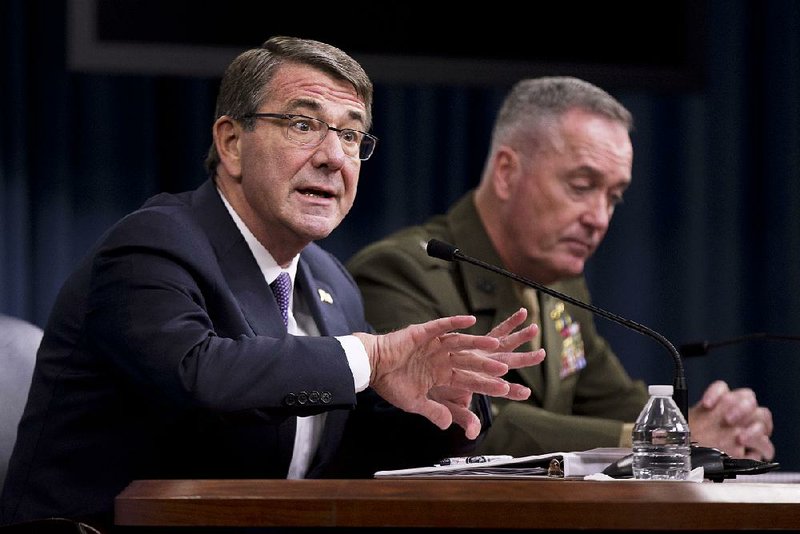WASHINGTON -- The Pentagon said Friday that it was moving to increase the number of U.S. forces in Iraq and announced that U.S. forces have killed the Islamic State's finance minister.
RELATED ARTICLES
http://www.arkansas…">Belgian police intensify hunthttp://www.arkansas…">ISIS on agenda for nuke summit http://www.arkansas…">Syria recaptures Palmyra site
"We are systematically eliminating ISIL's cabinet," Defense Secretary Ashton Carter said, using an alternative acronym for the extremist group.
Gen. Joseph Dunford, chairman of the Joint Chiefs of Staff, said recommendations on ways to increase U.S. support for Iraq's ground fight against the Islamic State extremist group, also known as ISIS, will be discussed with President Barack Obama soon.
"The secretary and I both believe that there will be an increase in U.S. forces in Iraq in coming weeks, but that decision hasn't been made," Dunford told Pentagon reporters during a briefing. He did not say how big that increase might be.
Dunford's comments came as Carter announced that several key members of the Islamic State were eliminated this week. According to a senior U.S. official, the group's finance minister was killed along with two associates in a U.S. raid in Syria. The finance minister is known by several names: Abdul-Rahman Mustafa Mohammed, Haji Iman, Haji Imam, Abu Iman, Haji Ayman and Abu Alaa al-Afari.
The U.S. Treasury Department separately lists his real name as Abd al-Rahman Mustafa al-Qaduli and includes him on its list of Specially Designated Global Terrorists.
The official described the Islamic State finance minister as a "longtime member, someone who forms connective tissue to the al-Qaida in Iraq days."
In a separate operation, a U.S. airstrike in Mosul killed another top Islamic State leader, the official said. Carter would not provide details of the strikes, and the U.S. official was not authorized to discuss the operations, so he spoke on condition of anonymity.
The successful attacks are part of a string of strikes targeting the group's leadership even as it loses territory in both Iraq and Syria. Dunford said there has been "indisputable" momentum against the Islamic State in recent weeks, as coalition airstrikes and Iraqi ground forces target the group's leaders, command and control structure, and financing.
"By no means would I say that we are about to break the back of ISIL or that the fight is over," Dunford said but added that there are a lot of reasons to be optimistic.
Carter said the senior Islamic State leader killed in Syria was a "well-known terrorist" who had a hand in terrorist plots outside Iraq and Syria. He said he was not aware of any link between the senior leader and this week's terrorist attacks in Belgium.
Carter said the senior leader has been associated with the Islamic State dating back to its earliest iteration as al-Qaida in Iraq. He said he had worked under Abu Musab al-Zarqawi as a liaison for operations in Pakistan.
"The removal of this ISIL leader will hamper the organization's ability to conduct operations both inside and outside Iraq and Syria," Carter said at a Pentagon news conference.
"Indeed, the U.S. military killed several key ISIL terrorists this week, including we believe Haji Iman, who was an ISIL senior leader serving as a finance minister and who also was responsible for some external affairs and plots," Carter said.
U.S. officials stopped short of describing the Islamic State leader as No. 2 in the organization, saying that he held an array of important positions but remained largely behind the scenes. He did not have the high public profile of Islamic State leader Abu Bakr al-Baghdadi or Abu Mohammad al-Adnani, who functions as the group's spokesman.
There was no immediate reaction from the Islamic State's official media, although jihadi social media sites noted the report of his death with skepticism.
Asked about the effect of the killings of key Islamic State militants, Carter said, "Leaders can be replaced. However, these leaders have been around for a long time. They are senior, they are experienced."
The U.S. military has killed numerous Islamic State leaders in recent months. Earlier this month, the Pentagon said it killed Omar al-Shishani, described as the Islamic State's "minister of war," in an airstrike in Syria. In November, the Pentagon said an airstrike in Libya killed Abu Nabil, another top Islamic State leader.
The Pentagon has targeted the leaders of groups such as al-Qaida and the Islamic State although senior leaders of these terrorist groups are often quickly replaced. "Striking leadership is necessary but far from sufficient," Carter said.
Information for this article was contributed by Lolita C. Baldor, Robert Burns and Qassim Abdul-Zahra of The Associated Press and by Thomas Gibbons-Neff, Greg Miller and Joby Warrick of The Washington Post.
A Section on 03/26/2016

